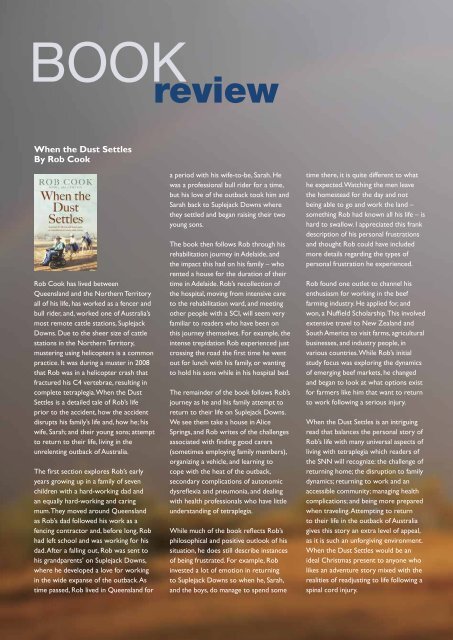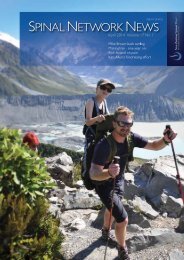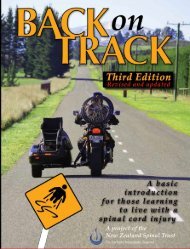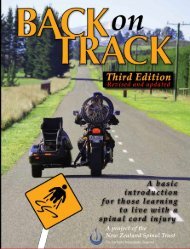SPINAL NETWORK NEWS
Create successful ePaper yourself
Turn your PDF publications into a flip-book with our unique Google optimized e-Paper software.
BOOK review<br />
When the Dust Settles<br />
By Rob Cook<br />
Rob Cook has lived between<br />
Queensland and the Northern Territory<br />
all of his life, has worked as a fencer and<br />
bull rider, and, worked one of Australia’s<br />
most remote cattle stations, Suplejack<br />
Downs. Due to the sheer size of cattle<br />
stations in the Northern Territory,<br />
mustering using helicopters is a common<br />
practice. It was during a muster in 2008<br />
that Rob was in a helicopter crash that<br />
fractured his C4 vertebrae, resulting in<br />
complete tetraplegia. When the Dust<br />
Settles is a detailed tale of Rob’s life<br />
prior to the accident, how the accident<br />
disrupts his family’s life and, how he; his<br />
wife, Sarah; and their young sons; attempt<br />
to return to their life, living in the<br />
unrelenting outback of Australia.<br />
The first section explores Rob’s early<br />
years growing up in a family of seven<br />
children with a hard-working dad and<br />
an equally hard-working and caring<br />
mum. They moved around Queensland<br />
as Rob’s dad followed his work as a<br />
fencing contractor and, before long, Rob<br />
had left school and was working for his<br />
dad. After a falling out, Rob was sent to<br />
his grandparents’ on Suplejack Downs,<br />
where he developed a love for working<br />
in the wide expanse of the outback. As<br />
time passed, Rob lived in Queensland for<br />
24<br />
a period with his wife-to-be, Sarah. He<br />
was a professional bull rider for a time,<br />
but his love of the outback took him and<br />
Sarah back to Suplejack Downs where<br />
they settled and began raising their two<br />
young sons.<br />
The book then follows Rob through his<br />
rehabilitation journey in Adelaide, and<br />
the impact this had on his family – who<br />
rented a house for the duration of their<br />
time in Adelaide. Rob’s recollection of<br />
the hospital, moving from intensive care<br />
to the rehabilitation ward, and meeting<br />
other people with a SCI, will seem very<br />
familiar to readers who have been on<br />
this journey themselves. For example, the<br />
intense trepidation Rob experienced just<br />
crossing the road the first time he went<br />
out for lunch with his family, or wanting<br />
to hold his sons while in his hospital bed.<br />
The remainder of the book follows Rob’s<br />
journey as he and his family attempt to<br />
return to their life on Suplejack Downs.<br />
We see them take a house in Alice<br />
Springs, and Rob writes of the challenges<br />
associated with finding good carers<br />
(sometimes employing family members),<br />
organizing a vehicle, and learning to<br />
cope with the heat of the outback,<br />
secondary complications of autonomic<br />
dysreflexia and pneumonia, and dealing<br />
with health professionals who have little<br />
understanding of tetraplegia.<br />
While much of the book reflects Rob’s<br />
philosophical and positive outlook of his<br />
situation, he does still describe instances<br />
of being frustrated. For example, Rob<br />
invested a lot of emotion in returning<br />
to Suplejack Downs so when he, Sarah,<br />
and the boys, do manage to spend some<br />
time there, it is quite different to what<br />
he expected. Watching the men leave<br />
the homestead for the day and not<br />
being able to go and work the land –<br />
something Rob had known all his life – is<br />
hard to swallow. I appreciated this frank<br />
description of his personal frustrations<br />
and thought Rob could have included<br />
more details regarding the types of<br />
personal frustration he experienced.<br />
Rob found one outlet to channel his<br />
enthusiasm for working in the beef<br />
farming industry. He applied for, and<br />
won, a Nuffield Scholarship. This involved<br />
extensive travel to New Zealand and<br />
South America to visit farms, agricultural<br />
businesses, and industry people, in<br />
various countries. While Rob’s initial<br />
study focus was exploring the dynamics<br />
of emerging beef markets, he changed<br />
and began to look at what options exist<br />
for farmers like him that want to return<br />
to work following a serious injury.<br />
When the Dust Settles is an intriguing<br />
read that balances the personal story of<br />
Rob’s life with many universal aspects of<br />
living with tetraplegia which readers of<br />
the SNN will recognize: the challenge of<br />
returning home; the disruption to family<br />
dynamics; returning to work and an<br />
accessible community; managing health<br />
complications; and being more prepared<br />
when traveling. Attempting to return<br />
to their life in the outback of Australia<br />
gives this story an extra level of appeal,<br />
as it is such an unforgiving environment.<br />
When the Dust Settles would be an<br />
ideal Christmas present to anyone who<br />
likes an adventure story mixed with the<br />
realities of readjusting to life following a<br />
spinal cord injury.
















